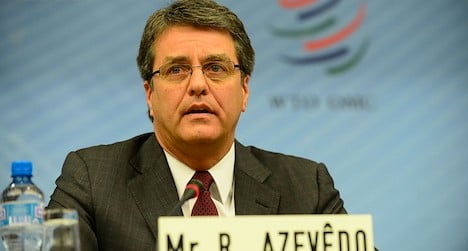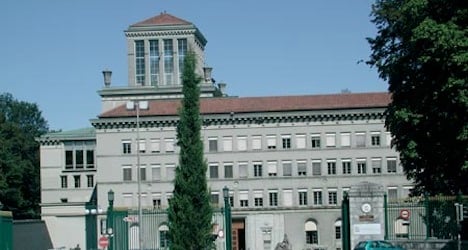Azevedo, currently Brazil's ambassador to the 159-nation WTO, pipped the former Mexican trade chief in a final round, the sources said on Tuesday, after seven other candidates stumbled earlier in the contest.
Azevedo and Blanco's campaign teams emerged tight-lipped from a meeting behind closed doors with Pakistan's WTO ambassador Shahid Bashir, who heads its Governing General Council.
No formal announcement was due until Wednesday, when WTO members were scheduled to meet to discuss the contest, while a General Council session next week will need to give Azevedo formal approval.
The WTO does not hold elections, but picks its chief by consensus, and along with his counterparts from Canada and Sweden, Bashir has spent weeks gauging countries' views on who is likely to muster the most support.
The current head of the WTO is Frenchman Pascal Lamy — a former trade chief of the European Union — who is due to step down on September 1st after two four-year terms at the helm.
His successor will face the tough task of trying to breath life into the WTO's moribund "Doha Round" of trade liberalisation talks, launched in 2001 with the goal of using international commerce to boost development in poorer member states.
On the eve of Tuesday's meeting, Blanco's campaign team had been in upbeat mode, telling AFP that without crying victory, they were "very, very confident".
Blanco, a 62-year-old economist, enjoys the reputation of a trade heavyweight.
He was Mexico's negotiator for the 1994 North American Free Trade Agreement, served as a minister of commerce and also boasts solid private sector credentials.
He and Azevedo repeatedly flagged up their broad support across a range of nations and economic levels, from the poorest to the richest, and had pitched a similar vision for breaking the Doha deadlock.
But 55-year-old Azevedo's insider status appeared to have clinched the contest for the Brazilian.
He has been Brazil's WTO ambassador since 2008, after working as a chief litigator in high-profile trade disputes, making him well placed to navigate the system to try to clear the Doha logjam.
The Doha Round, launched at a summit in Qatar in 2001, aims to open markets and remove trade barriers such as subsidies, excessive taxes and regulations, in order to harness international commerce to develop poorer economies.
But the concessions needed have sparked clashes notably between China, the EU, India and the United States, and Lamy's replacement will need to build bridges.
An unprecedented nine names entered the race to succeed Lamy.
Since it was created in its current form in 1995, the WTO's chiefs have been Irish, Italian, New Zealander and Thai, and with Frenchman Lamy in charge since 2005, emerging economies were long keen to claim the slot.
Those who stumbled in the first round in mid-April were from Kenya, Ghana, Jordan and Costa Rica, while Indonesia, South Korea and New Zealand exited the race in the second round at the end of the month.
WORLD TRADE ORGANIZATION
Brazilian diplomat tipped to head WTO: sources
Brazil's Roberto Azevedo has beaten Mexican veteran Herminio Blanco in the race to become the new leader of the Geneva-based World Trade Organization, sources close to the process say.
Published: 7 May 2013 20:49 CEST

Roberto Azevedo is set to become the World Trade Organization's new leader, sources say. Photo: WTO
Url copied to clipboard!


 Please whitelist us to continue reading.
Please whitelist us to continue reading.
Member comments